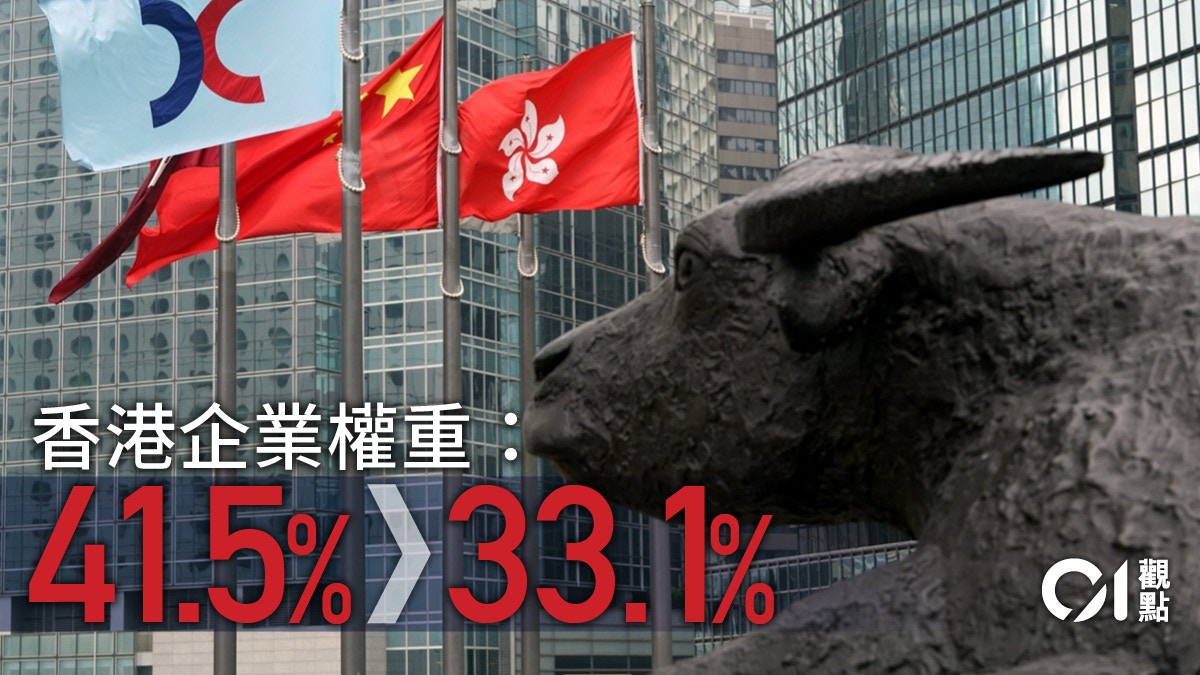01 view
Written by: Commentary Editing Room
2021-03-02 17:12
The last update date: 2021-03-02 17:13
On Monday (1st), the Hang Seng Index Company announced the largest reform plan since the establishment of the index.
The HSI reform is understandable. However, because Hong Kong's economic structure is overly dependent on banks, real estate and other sectors, the index reform has to face the dilemma of how to optimize constituent stocks and retain Hong Kong enterprises.
One of the key points of the Hang Seng Index reform is to expand the constituent stocks and change the stock selection mechanism in order to be more economic representative.
The reform plans to gradually increase the number of constituent stocks. The target is to increase from the current 55 constituent stocks to 80 and eventually to 100 by the middle of 2022.
The weight limit of individual stocks has also been lowered from the current 10% to 8%.
In addition to simply increasing the number of constituent stocks, the HSI will also divide the constituent stocks into seven major industries including finance, information technology, consumption, real estate construction, utilities/telecommunications, healthcare, and various industries. The stock selection will be divided into seven industry categories. Seven teams, to ensure that the market value coverage of each industry exceeds half.
Wu Wanwen, chief executive of the Hang Seng Index Company, said that the optimized Hang Seng Index will further enhance its representativeness.
(Provided by Hang Seng Index Company)
The dilemma between growth and representation
Another key point of reform is that the Hang Seng Index, as a representative index of the Hong Kong stock market, must consider how to retain the representativeness of Hong Kong companies.
Due to Hong Kong's complicated history and political status, its stock market is somewhat special compared to other countries in the world.
In particular, in recent years, more and more mainland companies have been listed in Hong Kong, and the proportion of Chinese stocks in Hong Kong stocks has become heavier, and the proportion of Chinese stocks in the Hang Seng Index has also increased in recent years.
Among the 55 constituent stocks of the Hang Seng Index, Hong Kong companies account for 24, with a weight of approximately 41.5%.
After the reform, the number of Hong Kong companies has not changed much, and will be reduced by one to 23. However, due to the substantial increase in the overall constituent stocks, their weight will further drop to 33.1%.
From the perspective of index growth, it is best to have more high-growth constituent stocks to attract more investors to invest.
However, from the perspective of Hong Kong's representativeness, Hong Kong's local companies with a certain market value are basically banks and real estate industries. However, these companies lack new growth points.
For a long time in the past, the Hang Seng Index “underperformed” the stock markets of other developed regions for a long time, and was even ridiculed as “with volatility but no increase”. One of the key reasons was that the index was dragged down by these companies.
Due to these limitations in Hong Kong, the HSI has long faced a dilemma: If you want to optimize its constituent stocks to attract more investors, you have to reduce the weight of Hong Kong companies, but this will make the index more difficult to represent the full picture of the "Hong Kong economy."
It seems that fish and bear's paw cannot have both.
Judging from the direction of the HSI reform this time, the proportion of Hong Kong companies has been further reduced, reflecting that the HSI can only be forced to make a choice.
The HSI is not the only one to reform
In fact, it is not only the Hang Seng Index Company that needs reform, but also the fact that Hong Kong companies have "unable to support Adou" situation.
If Hong Kong companies want to break the phenomenon of only banks and real estate, they must invest in advanced fields such as creativity and high technology.
Of course, this problem is not something that the Hang Seng Index Company can reform, but the Hong Kong government must come up with a more forward-looking industrial policy, on the one hand, training more local talents and supporting the local technological innovation industry.
On the one hand, economic exchanges between China and Hong Kong are becoming increasingly inseparable, and it can also attract more mainland innovation and technology companies to enter Hong Kong for development, and provide more external motivation.
The Hang Seng Index reorganizes blue chips to increase Hong Kong enterprises can only struggle for survival
Hong Kong's status as an international financial center will only become stronger
Hang Seng Index Hong Kong Economy 01 Viewpoint

